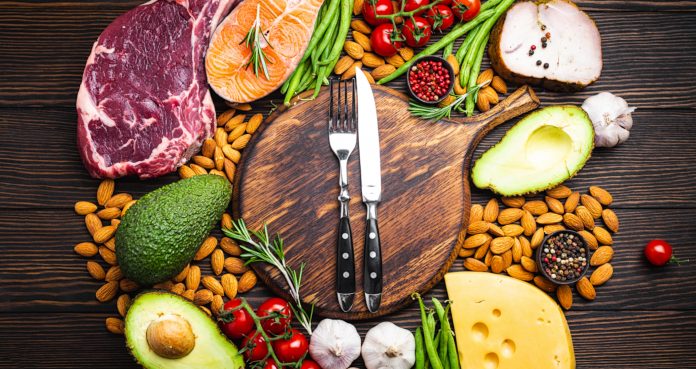Should Lifters Go Keto?
With low-carb diets currently prevailing, such as the ketogenic diet, it’s no wonder why lifters are sipping the kool-aid. But are diets that virtually eliminate an entire food group optimal for building muscle and performance?
Low-Carb and Keto Defined
Before we dive into what the research states regarding resistance training and low-carbohydrate diets, it’s vital that we define what a low-carb diet is. Without a universally agreed-upon objective definition, we’re left comparing against the Acceptable Macronutrient Distribution Ranges (AMDR). The AMDR is the intake range for a particular energy source associated with a reduced risk of chronic disease while providing essential nutrient intakes1.
The AMDR for carbohydrate intake in adults is 45-65% of total daily calories1; therefore, anything that falls short of this range is classified as a low-carb diet. Low-carb diets can be further categorized into non-ketogenic and ketogenic diets, with a carbohydrate composition of 50-150g and 50g or less, respectively2.
Albeit a subclass of low-carb diets, the ketogenic diet differs in its ability to produce a metabolic state called ketosis. To achieve ketosis, one needs to restrict carbohydrate intake to no more than 50g per day or ten percent of total daily calories (TDC) while maintaining a moderate protein intake (~20% of TDC) and ultra-high fat intake (~70% of TDC)2. Without sufficient glucose from carbohydrates, the body begins to break down fat stores for energy, a process known as fat oxidation. Consequently, ketone bodies start to appear in the bloodstream at higher rates than are usually seen in a non-ketogenic state2. Hence, the term ketosis.

Keto Diets and Body Composition
The fearmongering centered around carbohydrates most likely arose from the carbohydrate-insulin hypothesis touted by low-carb zealots, which basically states that carbs drive insulin, and insulin promotes fat storage3. While technically correct, the carbohydrate-insulin model overlooks the most critical variable driving fat metabolism – energy balance3.
In basic terms, energy balance refers to calories in and calories out. Regardless of the macronutrient composition, consuming more calories than are expended will inevitably produce weight gain. Conversely, expending more calories than are ingested will inevitably produce weight loss. No diet is exempt from this law.
A 2017 meta-analysis (study of studies) by Aragon and colleagues scrutinized all diets (from low-fat to low-carb/ketogenic and everything in between) and found that as long as calories and protein are equated between the diets being compared, no disparity exists between them for fat loss2.
So does this mean that lifters can follow low-carb and ketogenic diets for weight loss? Yes. Would it be optimal for building muscle? No.
Building muscle requires that a few criteria be satisfied. First, a caloric surplus must be achieved and consistently maintained. Next, at least 0.7-1.0 grams of protein per pound of bodyweight (1.6-2.2 g/kg) must be consumed to build and repair muscle tissue4. And lastly, resistance training must be performed to stimulate the anabolic process of muscle growth. A low-carb dieter should easily be able to meet these requirements, right? Not according to some recent studies.
An 8-week study by Vargas and colleagues randomly assigned subjects into a ketogenic diet group, a non-ketogenic diet group, and a control group5. All participants were instructed to eat 39 calories per kilogram of bodyweight to achieve a caloric surplus. Protein intake was equated at 2g/kg in both the keto diet and non-keto diet group. All subjects followed a supervised resistance training program. After eight weeks, lean body mass increased significantly in the non-ketogenic group but decreased in the ketogenic group.
A closer look at this study’s results reveals a drop in bodyweight and fat mass in the ketogenic group, indicating a failure to achieve and maintain a caloric surplus. This isn’t surprising given the satiating effects of low-carbohydrate and high- protein and fat diets, as referenced by several studies6-8.
Consider another study by Greene et al.. Researchers followed intermediate elite weightlifters and powerlifters on an ad libitum (unrestricted) conventional diet or ad libitum ketogenic diet over a three-month period9. Similar to Vargas’ findings, those following the ad libitum ketogenic diet lost significantly more body weight and lean body mass than the conventional group.
In case you’re still not convinced, take a look at a few more studies. Kysel and colleagues randomly assigned participants to a cyclical ketogenic reduction diet (CKD) and a nutritionally balanced reduction diet (RD)10. Protein intake was set at 1.6g/kg, which is sufficient in facilitating muscle growth4. All subjects were engaged in resistance training. Following the 8-week intervention, both groups lost significant body fat, not surprising given the caloric deficit, but the CDK group lost a considerable amount of lean mass.
Moreover, a group of researchers studied the effects of a ketogenic diet on body composition in trained females and found no changes in fat-free mass (muscle) in the keto group but favorable changes (increases) in the non-keto group11.
Keto Diets and Performance
Low-carb/keto diets may not be optimal for building muscle, but what about improving strength and power? So far, the data seems equivocal, with some studies showing a decrease in performance and others indicating no adverse effect9-14. In addition, a recent systematic review by Murphy and colleagues analyzed 16 studies that looked at the keto diet’s effect on power and strength compared to a mixed macronutrient diet15. Out of the 16 outcomes, three showed a decrease in performance, 11 showed no difference, and two showed an increase in performance.
However, if we step back and analyze the energy demands involved during certain resistance training phases, we may find our answer. Strength and power training performed in the low rep range (1-3 reps) rely heavily on the ATP-PC system. In contrast, higher rep ranges rely on glycogen stores and readily available glucose (carbohydrate). A lifter on a keto diet focusing solely on power development may not compromise their performance, but we can see how higher repetitions and volume (amount of work) seen in bodybuilding could pose a problem.
Final Thoughts
Although many purport a metabolic advantage to being in ketosis, there isn’t anything magical about it except the change in fuel utilization (fat instead of carbohydrate). Again, being in ketosis won’t circumvent the laws of thermodynamics – energy in/energy out. Therefore, it’s probably best to choose a sustainable diet, one you can adhere to long-term. Based on the overall data regarding the effects of ketogenic diets on performance and body composition, I would argue that it would probably be wise to keep your carbohydrates to optimize your gains in the gym.
References
- Trumbo, P., Schlicker, S., Yates, A. A., Poos, M., & Food and Nutrition Board of the Institute of Medicine, The National Academies (2002). Dietary reference intakes for energy, carbohydrate, fiber, fat, fatty acids, cholesterol, protein, and amino acids. Journal of the American Dietetic Association, 102(11), 1621-1630. http://doi.org/10.1016/s0002-8223(02)90346-9
- Aragon, A., et al. (2017). International society of sports nutrition position stand: diets and body composition. Journal of the International Society of Sports Nutrition, 14, 16. doi:10.1186/s12970-017-0174-y
- Hall, K. D., Guyenet, S. J., & Leibel, R. L. (2018). The Carbohydrate-Insulin Model of Obesity Is Difficult to Reconcile With Current Evidence. JAMA Internal Medicine, 178(8), 1103. doi:10.1001/jamainternmed.2018.2920
- Morton, R. W. et al. (2017). A systematic review, meta-analyses, and meta-regression of the effect of the protein supplementation on resistance training-induced gains in muscle mass and strength in healthy adults. British Journal of Sports Medicine. doi:10.1136/bjsports-2017-097608
- Vargas, S., Romance, R., Bonilla, J. L., Galancho, I., Espinar, S., Kreider, R. B., & Benitez-Porres, J. (2018). Efficacy of ketogenic diet on body composition during resistance training in trained men: A randomized controlled trial. Journal of the International Society of Sports Nutrition, 15(1). doi:10/1186/s12970-018-0236-9
- Weigle, D. S., Breen, P. A., Matthys, C. C., Callahan, H. S., Meeuws, K. E., Burden, V. R., & Purnell, J. Q. (2005). A high-protein diet induces sustained reductions in appetite, ad libitum caloric intake, and body weight despite compensatory changes in diurnal plasma leptin and gherkin concentrations. The American Journal of Clinical Nutrition, 82(1), 41-48. http://doi.org/10.1093/ajcn.82.1.41
- Kephart, W., Pledge, C., Roberson, P., Mumford, P., Romero, M., Mobley, C., Martin, J., Young, K., Lowery, R., Wilson, J., Huggins, K., & Roberts, M. (2018). The three-month effects of a ketogenic diet on body composition, blood parameters, and performance metrics in crossfit trainees: A Pilot Study. Sports, 6(1), 1. http://doi.org/10.3390/sports6010001
- Heatherly, A. J., Killen, L. G., Smith, A. F., Waldman, H. S., Hollingsworth, A., Seltmann, C. L., O’Neal, E. K. (2018). Effects of Ad libitum Low-Carbohydrate High-Fat Dieting in Middle-Age Male Runners. Medicine & Science in Sports & Exercise, 50(3), 570-579. http://doi.org/10.1249/mss.0000000000001477
- Greene, D. A., Varley, B. J., Hartwig, T. B., Chapman, P., & Rigney, M. (2018). A low-carbohydrate ketogenic diet reduces body mass without compromising performance in powerlifting and olympic weightlifting athletes. Journal of Strength and Conditioning Research, 32(12), 3373-3382. http://doi.org/10.1519/jsc.000000000002904
- Kysel, P., Haluzikova, D., Dolezalova, R. P., Lankova, I., Lacinova, Z. N., Kasperova, B. J., Trnovska, J. Hradkova, V., Mraz, M. S., Vilikus, Z. E., & Haluzik, M. (2020.). The influence of cyclical ketogenic reduction diet vs nutritionally balanced reduction diet on body composition, strength, and endurance performance in healthy young males: a randomized controlled trial. Nutrients, 12(9), 2832. http://doi.org/10.3390/nu12092832
- Vargas, S., Petro, J. L., Romance, R., Kreider, R. B., Schoenfeld, B. J., Bonilla, D. A., Benitez-Porres, J. (2020). Effects of a ketogenic diet on body composition and strength in trained women. Journal of the International Society of Sports Nutrition, 17(1). http://doi.org/10.1186/s12970-020-00348-7.
- Paoli, A., Grimaldi, K., Agostino, D., Cenci, L., Moro, T., Bianco, A., et al. (2012). Ketogenic diet does not affect strength performance in elite artistic gymnasts. Journal of the International Society of Sports Nutrition, 9(1). http://doi.org/10.1186/1150-2283-9-34
- Sawyer, J. C., Wood, R. J., Davidson, P. W., Collins, S. M., Matthews, T. D., Gregory, S. M., & Paolone, V. J. (2013). Effects of a Short-Term Carbohydrate-Restricted Diet on Strength and Power Performance. Journal of Strength and Conditioning Research, 27(8), 2255–2262. https://doi.org/10.1519/jsc.0b013e31827da314
- Wilson, J. M., Lowery, R. P., Roberts, M. D., Sharp, M. H., Joy, J. M., Shields, K. A., Partl, J. M., Volek, J. S., & D’Agostino, D. P. (2020). Effects of Ketogenic Dieting on Body Composition, Strength, Power, and Hormonal Profiles in Resistance Training Men. Journal of Strength and Conditioning Research, 34(12), 3463–3474. https://doi.org/10.1519/jsc.0000000000001935
- Murphy, N. E., Carrigan, C. T., & Margolis, L. M. (2020). High-Fat Ketogenic Diets and Physical Performance: A Systematic Review. Advances in Nutrition. https://doi.org/10.1093/advances/nmaa101

